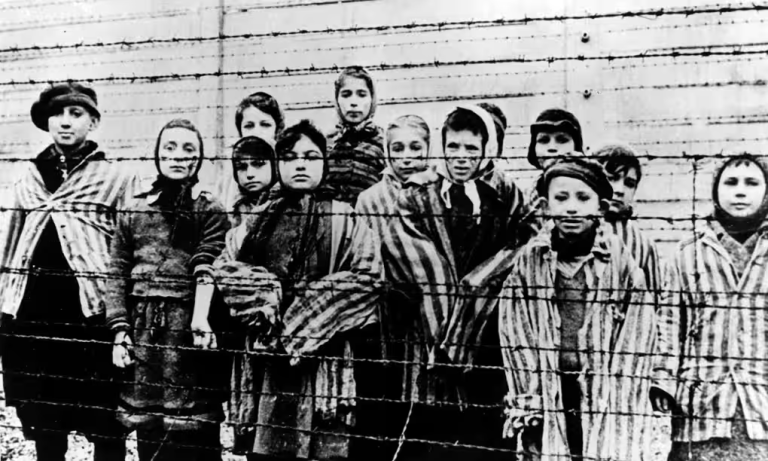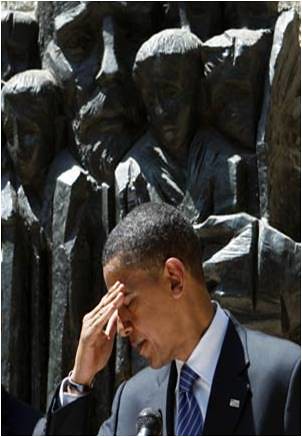
Had the horrible events of the Nazi occupation not transpired, Janusz Korczak would still be remembered as one of the great educational innovators and child advocates of the twentieth century. However, his courageous response to the events of the Holocaust established him as something even greater.

Barack Obama pauses during a ceremony in Janusz Korczak
Squareat Yad Vashem Holocaust Museum in Jerusalem.
Many years ago my good friend David Gilfix wrote a play about the great Jewish-Polish orphanage director, Janusz Korczak, and it was ultimately produced in New York. The following is the introduction to the play:
“If the value of a museum exhibition can be determined by its long-term impact, then the Ghetto Fighter’s Museum on Kibbutz Lohame Getaot in Israel was invaluable to me. It was at this museum in the early 1980s that I first learned about the Jewish/Polish orphanage director, Janusz Korczak. So powerful was this exhibit that I decided there and then to someday write a play about this man. I wanted to bring Korczak, his co-director Stefa Wilczynska, and the children they sought to protect back to life. I wanted to know them. And for me, the only possible way of doing this was in the form of a play.”

Janusz Korczak with friends and children.
Having visited orphanages in the developing world at that point of my life, I think subliminally David’s play began to focus my mind on what I could do to help save today’s children in crisis. The result was the creation of Orphans International Worldwide, now affiliated with the United Nations, which takes an interfaith approach to raising children in their own cultures.


Staff and children of Nasz Dom (“Our Home”) Orphanage,
run by Maryna Falska and Janusz Korczak in Pruszkow, Poland.
Janusz Korczak, the pen name of Henryk Goldszmit, was a complicated yet brilliant, multi-faceted man. There was Korczak the author, whose witty novels, social satires, and children’s books were read across Europe. There was Korczak the doctor, whose research and publications in medical journals were instrumental towards major improvements to pediatrics in pre-World War II Poland. Most of all, there was Korczak the exceptional orphanage administrator.
Korczak established a Jewish orphanage in Warsaw in 1911 called the “Dom Sierot,” and together with Stefa Wilczynska, he ran it for more than thirty years. He also ran a Christian orphanage in Bielany and served on the Board of Directors of several other orphanages.
Korczak’s revolutionary ideas about child development almost single-handedly upgraded the orphanage institution in Poland. His theories about a child’s “right to respect” and “the dignity of the child” had enormous influence throughout Poland and Europe. Korczak’s Children’s Court, which became integral to the way he nurtured and governed children within his orphanage, is still studied today.
When Germany invaded Poland in World War II and forced a huge portion of the Jewish population including the Dom Sierot inside the Warsaw Ghetto, Korczak’s total energy was devoted to saving his orphans as well as other abandoned children.
Had the horrible events of the Nazi occupation not transpired, Korczak would still be remembered as one of the great educational innovators and child advocates of the twentieth century. However, his courageous response to the events of the Holocaust established him as something even greater.
Korczak received multiple offers from well-meaning friends outside the Ghetto walls to be smuggled to freedom. He rejected all of them, for he would not abandon his children.
On August 5th, 1942, Korczak, Stefa Wilczynska, and approximately 200 orphans were put on a train that would take them to their death in Treblinka. Immediately thereafter, the Warsaw Ghetto Fighters adopted a new battle cry: “Remember Korczak’s children!” He had become legend.
Today Janusz Korczak is a national hero in Poland. Israeli school children learn about his exploits. And in Poland, at the site of the former death camp in Treblinka, there are numerous plaques commemorating the countries from which people died. Only one mentions a person’s name. It says, “Janusz Korczak and the Children.”